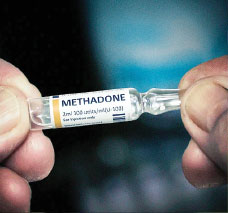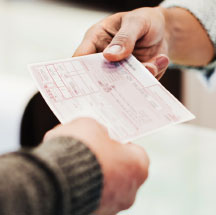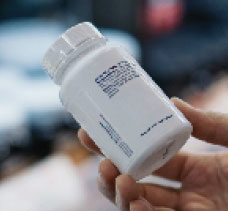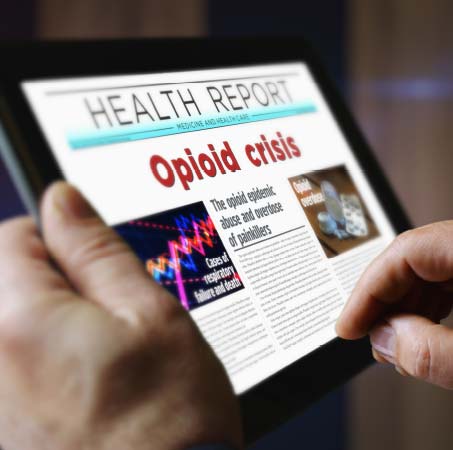What is an
opioid?
Opioids are a type of drug naturally found in the opium poppy plant. Some opioids are made from the plant directly, while others are made by scientists in labs using the same chemical structure.1
Opioids are often used as medicines because they can relax the body and relieve pain, for example after surgery or an injury. They can also be used to treat coughing and diarrhoea.1
Opioids work by interacting with the body’s opioid receptors, which are mainly found in the brain and spinal cord. These receptors play an important role in regulating pain, pleasure, and other sensations.1

THE DIFFERENT
TYPES OF OPIOIDS
ILLEGAL
OPIOIDS
Illegal opioids, such as heroin, are not prescribed by healthcare professionals and are often associated with significant health risks2

SYNTHETIC
OPIOIDS
Man-made opioids, like fentanyl and nitazenes, are created in laboratories. They can be many times more potent than natural opioids, posing a higher risk of overdose3,4

PRESCRIPTION
OPIOIDS
Healthcare professionals prescribe these medications to manage pain. Common prescription opioids include oxycodone and morphine5

OVER-THE-
COUNTER (OTC)
OPIOIDS
The opioid codeine is available over-the-counter in the UK, often in combination with other medications, for mild pain relief. However, even OTC formulations require responsible use due to potential risks6

The dangers of
synthetic opioids
Synthetic opioids have gained attention due to their potency and involvement in overdoses and deaths
They are sometimes mixed with other substances, contributing to the opioid crisis.
Fentanyl, in particular, is a powerful synthetic opioid, and even a small amount can lead to a life-threatening overdose.3
Recently, synthetic opioids called nitazenes have been found to be responsible for an increase in heroin-related overdoses and deaths in the UK.4
It can be more difficult to judge how much heroin to take if it has been mixed with nitazenes. If you are in contact with a heroin user it is therefore more important than ever to be able to recognise the possible symptoms of an overdose and how to respond.4

WHAT IS
OPIOID ADDICTION?
An addiction is when something that began as feeling pleasurable now feels like something you can’t live without.
With a drug addiction, there is an out-of-control feeling that you must continue taking a medicine or drug even though it is causing harm. Opioids in particular are highly addictive because they activate the reward centers in our brains.7
It is important to remember that an opioid addiction can affect anyone, regardless of their background or circumstances.
An opioid addiction does not make someone ‘weak’ or ‘bad’, because they are actually struggling with a complex biological and psychological condition.

HOW OPIOIDS CAN
LEAD TO ADDICTION
Opioid addiction is a complex condition involving changes in the brain that first lead to a tolerance and then a dependence to opioids.7
Watch the short film below to learn more about the changes that happen in the body as an opioid addiction develops.
Recognising the signs
of opioid addiction
Opioid addiction can sometimes bring about noticeable changes in behavior that can affect not only the person struggling with addiction but also their friends and family.
The signs of heroin use in particular can be very different from person to person and can depend on things like the length of abuse or presence of mental illness.
Although some changes in behaviour could be a sign of heroin use, remember that they do not necessarily mean that someone has an addiction to heroin or other opioids.

The typical signs of
addiction to
opioid medicines9
Taking the medicine differently
Taking opioids unnecessarily
Mood Changes
Sleep pattern changes
Borrowing or ‘losing’ medication
Seeking multiple prescriptions
Poor decision-making
Taking the medicine differently
Using opioid medicines in ways not prescribed by your doctor, such as taking more than the recommended dose or using them for the way they make you feel.

Taking opioids unnecessarily
Taking opioid medicines ‘just in case’ even when there is no pain, which could be a sign of opioid dependence.

Mood Changes
Experiencing noticeable mood swings, ranging from extreme elation to hostility.

Sleep pattern changes
Observing shifts in sleep patterns, which may be linked to opioid use.

Borrowing or ‘losing’ medication
Borrowing medications from others or frequently ‘losing’ medications, leading to repeated prescriptions.

Seeking multiple prescriptions
Visiting multiple doctors to obtain the same prescription, possibly to ensure a backup supply.

Poor decision-making
Engaging in risky behavior that can jeopardise their safety and the well-being of others.

What to do if you
suspect an opioid addiction
If you think that you or someone you know has an addiction to opioids, or is at risk of becoming addicted, there are many resources available to help. Here are a few options:
The GP:
They will be able to assess the situation
and recommend appropriate treatment or
referral options.
NHS Drug Treatment Service:
Offering a range of free and confidential services,
including one-to-one and group, medication-assisted
treatment, blood testing and vaccinations.
How to avoid
opioid addiction
Unfortunately the risk of addiction cannot be completely avoided, but there are steps people can take to reduce their chances of developing a problem with opioids.
These include making sure that prescription opioids are used safely and only when necessary, and being aware of the potential risks of over-the-counter (OTC) opioid-containing medications.10

- Learn about the potential risks associated with opioid medicines
Be
informed
- Before you are prescribed opioids, your doctor must know if you have a history of substance use or addiction
- Take the medicine exactly as directed by your doctor, pharmacist, or on the leaflet included in the pack
Practise
safe use
- When purchasing pain relief or discussing with your doctor, consider non-opioid alternatives, which can often have a lower risk of addiction
- Be mindful of your medication use, and seek help if you show any signs of dependence or misuse
Reduce
the risk
References
- National Institute on Drug Abuse (NIDA) (2021). Prescription Opioids DrugFacts. [online] National Institute on Drug Abuse. Available at: https://nida.nih.gov/publications/drugfacts/prescription-opioids [Accessed July 2024].
- European Monitoring Centre for Drugs and Drug Addiction (2023). Heroin and other opioids – the current situation in Europe (European Drug Report 2023) | www.emcdda.europa.eu. [online] Available at: https://www.emcdda.europa.eu/publications/european-drug-report/2023/heroin-and-other-opioids_en [Accessed July 2024].
- Oasis Runcorn. (2023). Fentanyl Addiction Treatment & Detox | Start Rehab Today. [online] Available at: https://www.oasisrehab.co.uk/rehab/prescription-drug/opioid/fentanyl-treatment/ [Accessed July 2024].
- National Patient Safety Alert, July 2023 – Potent synthetic opioids implicated in heroin overdoses and deaths: https://www.cas.mhra.gov.uk/ViewandAcknowledgment/ViewAlert.aspx?AlertID=103236 [Accessed July 2024].
- Krieger, C. (2018). What Are Opioids and Why Are They dangerous? [online] Mayo Clinic. Available at: https://www.mayoclinic.org/diseases-conditions/prescription-drug-abuse/expert-answers/what-are-opioids/faq-20381270 [Accessed July 2024].
- Mody, S., Kirkdale, C.L., Thornley, T., Dickinson, A., Avery, A.J., Knaggs, R., Rann, S. and Bastable, R. (2020). Over-the-counter codeine: can community pharmacy staff nudge customers into its safe and appropriate use? Pharmacy, 8(4), p.185. doi:https://doi.org/10.3390/pharmacy8040185.
- Kosten, T. and George, T. (2002). The Neurobiology of Opioid Dependence: Implications for Treatment. Science & Practice Perspectives, [online] 1(1), pp.13–20. doi:https://doi.org/10.1151/spp021113.
- Village Behavioral Health Treatment Center. (2023). Signs, Symptoms & Effects of Heroin Abuse in Adolescents | Village Behavioral Health. [online] Available at: https://www.villagebh.com/addiction/heroin/symptoms-signs-effects/ [Accessed July 2024].
- Mayo Clinic (2018). How to tell if a loved one is abusing opioids. [online] Mayo Clinic. Available at: https://www.mayoclinic.org/diseases-conditions/prescription-drug-abuse/in-depth/how-to-tell-if-a-loved-one-is-abusing-opioids/art-20386038 [Accessed July 2024].
- Mayo Clinic (2023). How opioid addiction occurs. [online] Mayo Clinic. Available at: https://www.mayoclinic.org/diseases-conditions/prescription-drug-abuse/in-depth/how-opioid-addiction-occurs/art-20360372 [Accessed July 2024].

